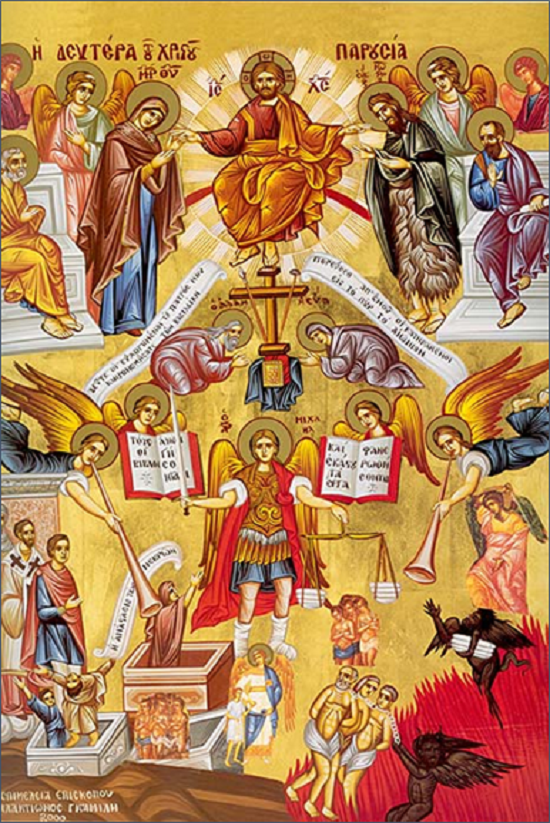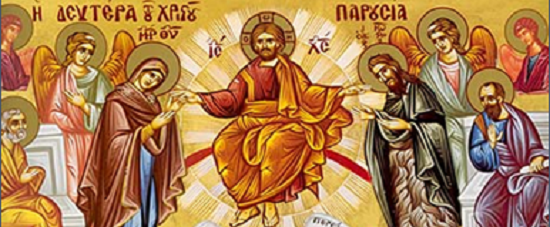The Day of Yahweh Comes
Thirty-Third Sunday Scripture Readings

This is the last Sunday of Ordinary Time. Next Sunday, we’ll celebrate the end of our liturgical year with the Solemnity of Christ the King. Whenever we reach the conclusion of anything in life, we’re drawn to reflect on the transition—what we’re leaving behind and what lies ahead. For the Gospel of Mark that we’ve been following since last Advent, what’s next is the passion narrative which marks the end of Jesus’s public ministry and the beginning of his transition into glory and into his Mystical Body, the Church. Can we blame Mark for using this moment to bring us a meditation on the last days, the end of time, the eschaton?
What we’re missing here in this gospel passage is its context. Earlier in this chapter, Jesus has been telling his disciples about what’s coming. He spoke of wars and rumors of war, earthquakes and famines. He tells them about persecutions and betrayals. And he tells them not to lose hope because these things, as disturbing as they may be, are only like pregnancy contractions. They may be indications of a birth yet to come, but, in a sense, they’re false alarms. Labor has not yet begun. The descriptions Mark uses throughout this whole section rely on imagery from the Hebrew Bible—especially the prophets. We call this particular type of descriptive text “apocalyptic” writing. It’s a form of literature specific to the Hebrew people in Biblical times, and it’s no longer in use. That’s why it’s so hard to understand. These writings use symbolic language to hide the literal meanings, and they need to be deciphered to be understood. They’re not themselves to be taken literally, nor should they be seen as a sort of history-in-reverse that describes actual events that are yet to come.
Once Jesus has told them about the coming signs, the disciples ask, “When will these things happen?” Jesus describes the culmination of these things in terms of the desecration and destruction of the Jerusalem temple. The temple had not yet been destroyed when Mark wrote his gospel, so it’s probable that Jesus foresaw and predicted that event. In a certain sense, the destruction of the city of Jerusalem and its temple by the Romans was, indeed, the end of the Israelite world. For Jews and Christians alike, their universe of understanding could be characterized by the period before the destruction and the period afterward. It was a different world with a different set of meanings. Like wind blowing on a mature dandelion, the fall of Jerusalem scattered the faithful throughout the world, leaving only an empty stem behind.
Jesus borrows apocalyptic language from the prophets who described the “Day of Yahweh.” The signs in the heavens hint at a disruption in the order of creation and the reemergence of the primal chaos. It’s no coincidence that many of these apocalyptic images were used to describe Jesus’s crucifixion: the earthquakes and the darkening of the sun. The death of Christ was, in a real sense, the “Day of Yahweh,” the end of one world of meaning and the beginning of another one. And yet, obviously, it wasn’t the end of time.
Our gospel reading today picks up from that point in the story. What we read today referred to the coming of the Son of Man spoken of by the prophets, especially Ezechiel and Daniel—both of whom used apocalyptic language to convey their message. The coming of the Son of Man on the Day of Yahweh would have two consequences: first, the Reign of God would have begun; second, the world’s population would be subject to judgment. Even our Nicene Creed says, “He will come again in glory to judge the living and the dead.” Yet, we must beware of mistaking the Day of Yahweh, the day of judgment, for some future moment that we might call the “end of the world.” The Son of Man is coming into the world, yes. However, the Son of Man is continuously coming into the world, bringing about the Reign of God, symbolized by the “clouds of heaven.”
The judgment of salvation or condemnation reached its climax on Calvary. The Day of Yahweh broke into our world with the death and resurrection of Christ. The judgment is this: do we continue with our foolish self-reliance to save us, or do we trust in God to raise us up and so abandon ourselves to him in faith? Do we choose futility and death, or surrender and resurrection? Do we align ourselves with the useless powers of this world, or do we allow ourselves to be assumed into the Reign of God? The coming of the Son of Man to judge us, whether living or dead, could be likened to staring into eyes that can see into the darkest recesses of our being. To be seen as we really are is to be judged, and we are seen by God every moment of every day of our lives.
When will these things happen? Jesus said, “Amen, amen, I say to you, this generation will not pass away until all these things have taken place.” They took place yesterday, they’re taking place today, and they’ll be taking place tomorrow. In the Gospel of John, Jesus says, “And this is the [judgment], that the light came into the world, but people preferred darkness to light because their deeds were evil.” [John 3:19] So, don’t waste your time speculating about the day of judgment—“of that day or hour no one knows”—because the Day of Yahweh, the day of judgment, the day when “the Son of Man will come on the clouds of heaven to judge the living and the dead,” that day is today, and that hour is now.
Get articles from H. Les Brown delivered to your email inbox.
